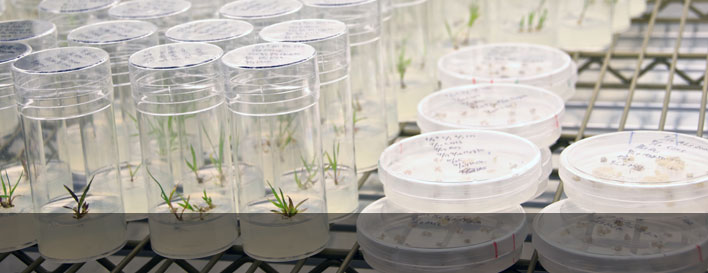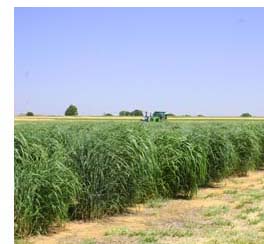Dr. Ramanjulu Sunkar


“We hope to identify key factors important for biomass accumulation and stress tolerance that are controlled by microRNA-guided posttranscriptional gene regulation. Educating the public as well as prospective scientists in this important area of research will further strengthen our already established prominence in biofuels research.”

Dr. Sunkar’s primary research area is plant molecular biology involving gene regulation. This includes identification of key microRNAs and their target genes involved in plant growth and development. By manipulating the expression of such microRNAs or genes, he and his co-researchers aim to improve biomass accumulation of switchgrass or other biofuel plant species.
Proteins are the building blocks of all living cells. The type of cell, its function and the timing of its death are determined by which proteins are produced in the cell, and at what quantities and time they are produced. However, the proteins are the end product of a complex process, which begins with the genetic code present in DNA.
The relevant parts of the DNA are copied into a messenger RNA, which holds a code with instructions on how to build a specific protein. The microRNA regulates the number of protein molecules produced by the messenger RNA molecule. The silencing of microRNA target genes at appropriate places and times allows the plant to grow normally. Otherwise, plant growth and development would be severely affected. Along the same lines, microRNA-controlled regulation of gene expression is necessary for adapting to drought, heat or lack of nutrients such as phosphate and sulfate.
By cataloging the microRNAs in switchgrass in great detail, Sunkar has identified 260 microRNAs belonging to 45 different families and 12 new microRNAs that are absent in different plant species.
The research of Dr. Sunkar and his team is revealing the complexity of microRNA-guided gene regulations operating in switching, and laying the foundation for future functional genomics research on switchgrass.
The scientists will continue to investigate whether microRNAs play a role in drought or heat stress tolerance of switchgrass. And if so, which ones? Sunkar seeks to identify key factors important for biomass accumulation and stress tolerance that are controlled by microRNA-guided posttranscriptional gene regulation.
Pictured (above): Dr. Sunkar's research will aid in the development of more efficient and disease-tolerant switchgrass plants. (Photo Credit: OSU Agricultural Communication Services)
Bold items indicate OK EPSCoR-supported research
- Matts, J., G. Jagdaeeswaran,, B. A. Roe, and R. Sunkar. "Identification of MicroRNAs and Their Targets in Switchgrass, a Model Biofuel Plant Species." Journal of Plant Physiology 167 (2010): 896-904. SciVerse.
Access the article
- Sunkar, R. "MicroRNAs with Macro-effects on Plant Stress Responses." Seminars in Cell & Developmental Biology 21.8 (2010): 805-11. SciVerse.
Access the article
- Li, Y., Y. Zheng, C. Addo-quaye, Z. Li, A. Saini, G. Jagadeeswaran, M. Axtell, W. Zhang, and R. Sunkar. "Transcriptome-wide Identification of MicroRNA Targets in Rice." Plant Journal 62.5 (2010): 742-59. Wiley Online Library.
Access the article
- Jagadeeswaran, G., Y. Zheng, Y-F Li, L. I. Shukla, P. Hoyt, S. L. Macmil, G. B. Wiley, B. A. Roe, W. Zhang, and R. Sunkar. "Cloning and Characterization of Small RNAs from Medicago Truncatula Reveals Four Novel Legume-specific MicroRNA Families." New Phytologist 184 (2009): 85-98. Wiley Online Library, 23 June 2009.
Access the article
- Jagadeeswaran, G., A. Saini, and R. Sunkar. "Biotic and Abiotic Stress Down-regulate MiR398 Expression in Arabidopsis." Planta 229.4 (2009): 1009-014. SpringerLink. Web.
Access the article
